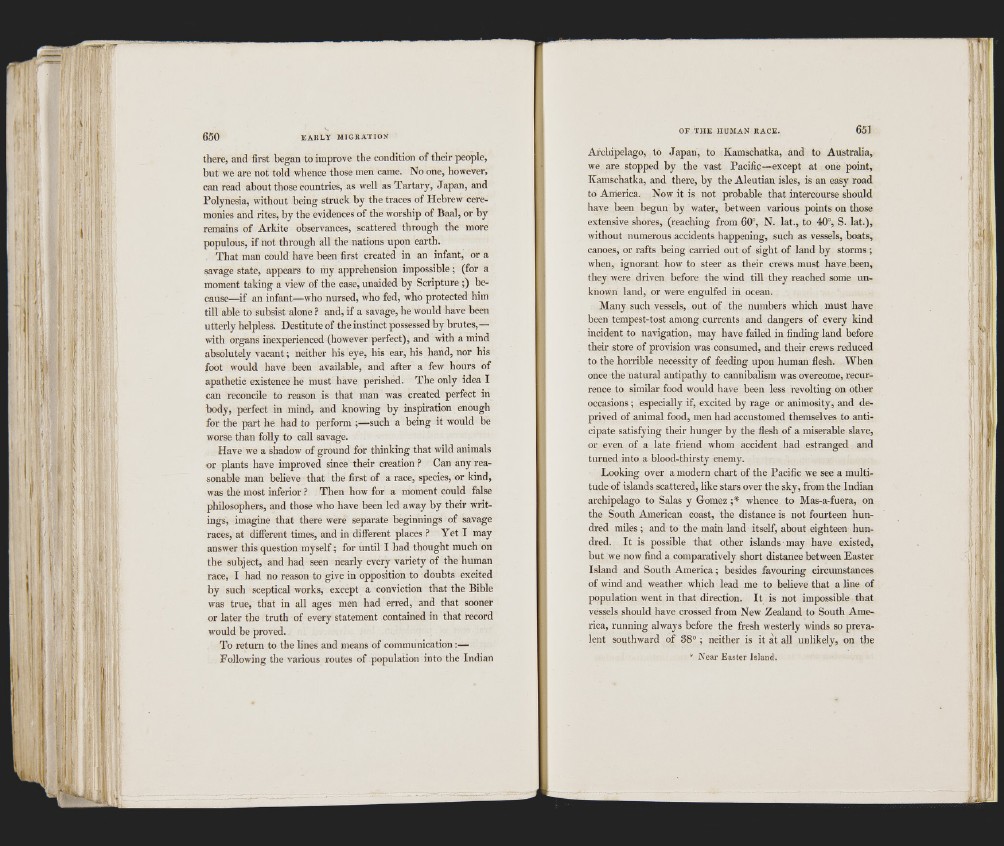
• t i il '
Mi
iUi;
i,' ,
' l i
f J
: il 'ri: fi ‘ -
' ‘A
650 EARLY MIGRATION
there, and first began to improve the condition of their people,
but we are not told whence those men came. No one, however,
can read about those countries, as well as Tartary, Japan, and
Polynesia, without being struck by the traces of Hebrew ceremonies
and rites, by the evidences of the worship of Baal, or by
remains of Arkite observances, scattered through the more
populous, if not through all the nations upon earth.
. That man could have been first created in an infant, or a
savage state, appears to my apprehension impossible; (for a
moment taking a view of the case, unaided by Scripture ;) because—
if an infant—who nursed, who fed, who protected him
till able to subsist alone ? and, if a savage, he would have heen
utterly helpless. Destitute of the instinct possessed by brutes,—
with organs inexperienced (however perfect), and with a mind
absolutely vacant; neither his eye, his ear, his hand, nor his
foot would have been available, and after a few hours of
apathetic existence he must have perished. The only idea I
can reconcile to reason is that man was created perfect in
body, perfect in mind, and knowing by inspiration enough
for the part he had to perform ;—such a being it would be
worse than folly to call savage.
Have we a shadow of ground for thinking that wild animals
or plants have improved since their creation? Can any reasonable
man believe that the first of a race, species, or kind,
was the most inferior ? Then how for a moment could false
philosophers, and those who have been led away by their writings,
imagine that there were separate beginnings of savage
races, at different times, and in different places ? Yet I may
answer this question myself; for until I had thought much on
the subject, and had seen nearly every variety of the human
race, I had no reason to give in opposition to doubts excited
by such sceptical works, except a conviction that the Bible
was true, that in all ages men had erred, and that sooner
or later the truth of every statement contained in that record
would be proved.
To return to the lines and means of communication :—
Following the various routes of population into the Indian
OF THE HUMAN RACE. 651
Archipelago, to Japan, to Kamschatka, and to Australia,
we are stopped by the vast Pacific—except at one point,
Kamschatka, and there, by the Aleutian isles, is an easy road
to America. Now it is not probable that intercourse should
have been begun by water, between various points on those
extensive shores, (reaching from 60°, N. lat., to 40°, S. lat.),
without numerous accidents happening, such as vessels, boats,
canoes, or rafts heing carried out of sight of land by storms;
when, ignorant how to steer as their crews must have been,
they were driven before the wind till they reached some unknown
land, or were engulfed in ocean.
Many such vessels, out of the numbers which must have
been tempest-tost among currents and dangers of every kind
incident to navigation, may have failed in finding land before
their store of provision was consumed, and their crews reduced
to the horrible necessity of feeding upon human flesh. When
once the natural antipathy to cannibalism was overcome, recurrence
to similar food would have been less revolting on other
occasions; especially if, excited by rage or animosity, and deprived
of animal food, men had accustomed themselves to anticipate
satisfying their hunger by the flesh of a miserable slave,
or even of a late friend whom accident had estranged and
turned into a blood-thirsty enemy.
Looking over a modern chart of the Pacific we see a multitude
of islands scattered, like stars over the sky, from the Indian
archipelago to Salas y Gomez ;* whence to Mas-a-fuera, on
the South American coast, the distance is not fourteen hundred
miles; and to the main land itself, about eighteen hundred.
It is possible that other islands may have existed,
but we now find a comparatively short distance between Laster
Island and South America; besides favouring circumstances
of wind and weather which lead me to believe that a line of
population went in that direction. I t is not impossible that
vessels should have crossed from New Zealand to South America,
running always before the fresh westerly winds so prevalent
southward of 38“ ; neither is it at all unlikely, on the
* Near Easter Island.
:■!i ,
I 1«
■j-f
ft ti!'.-
:, II Win
4
If Iii
, 1
■ f!